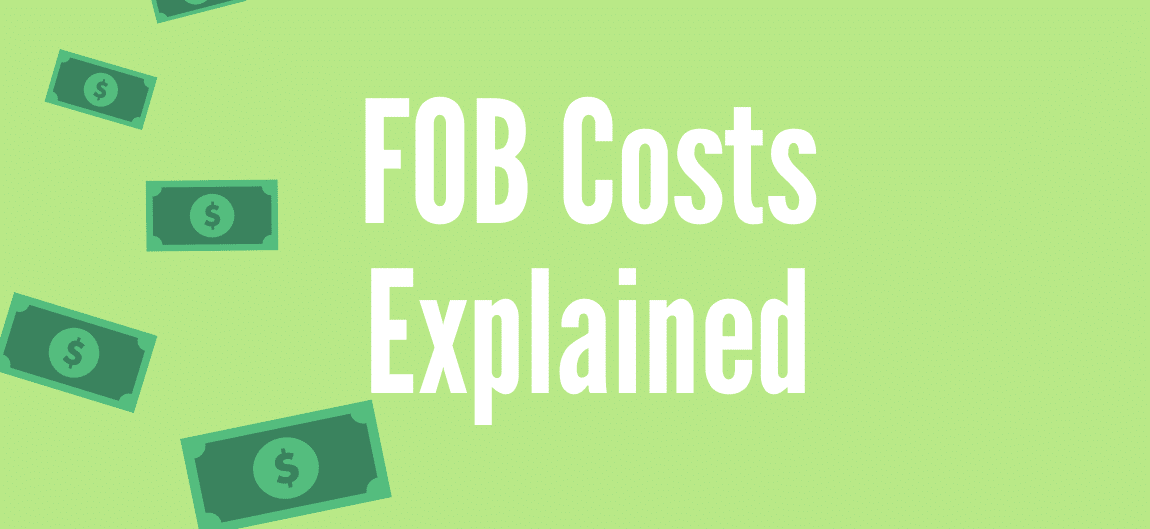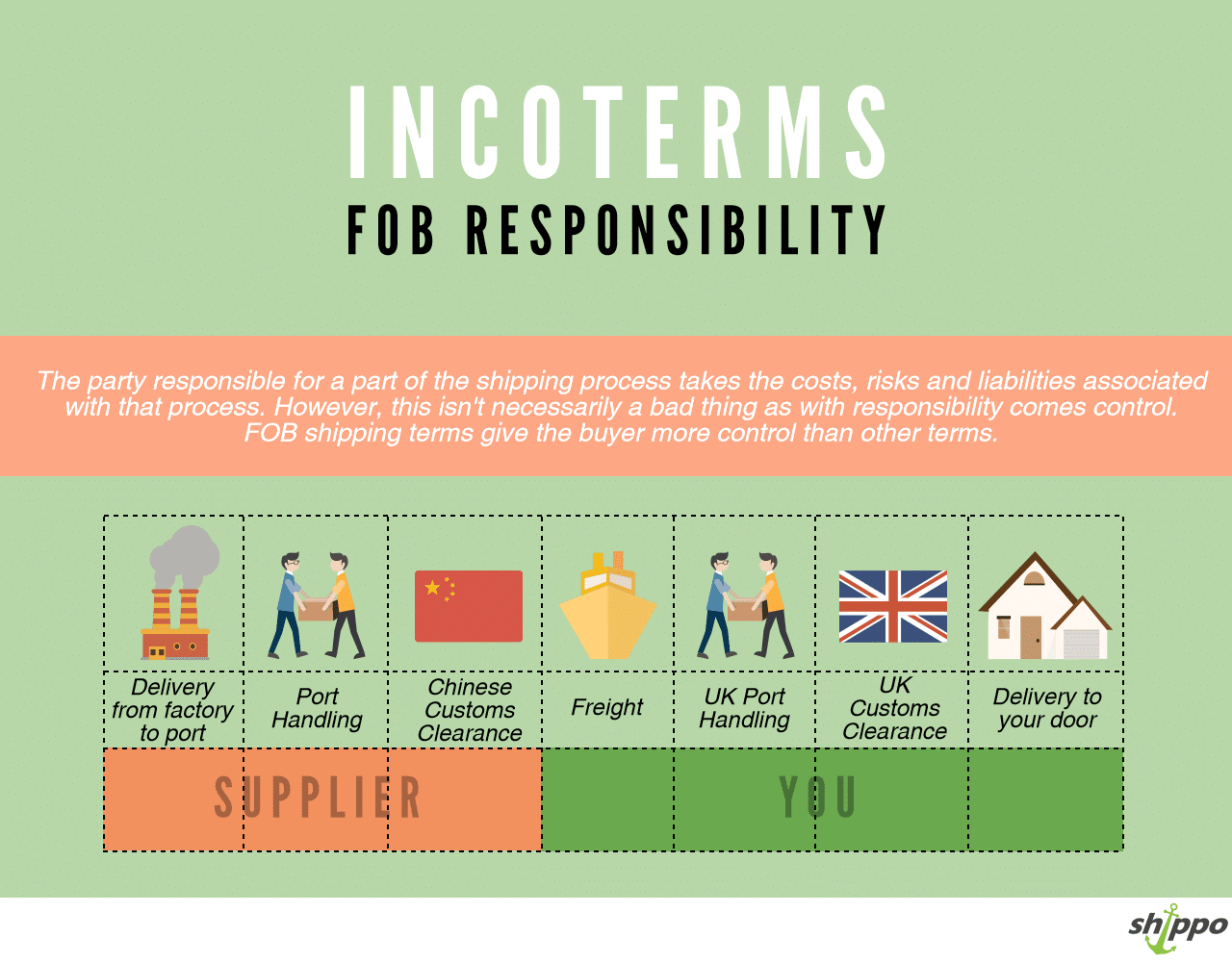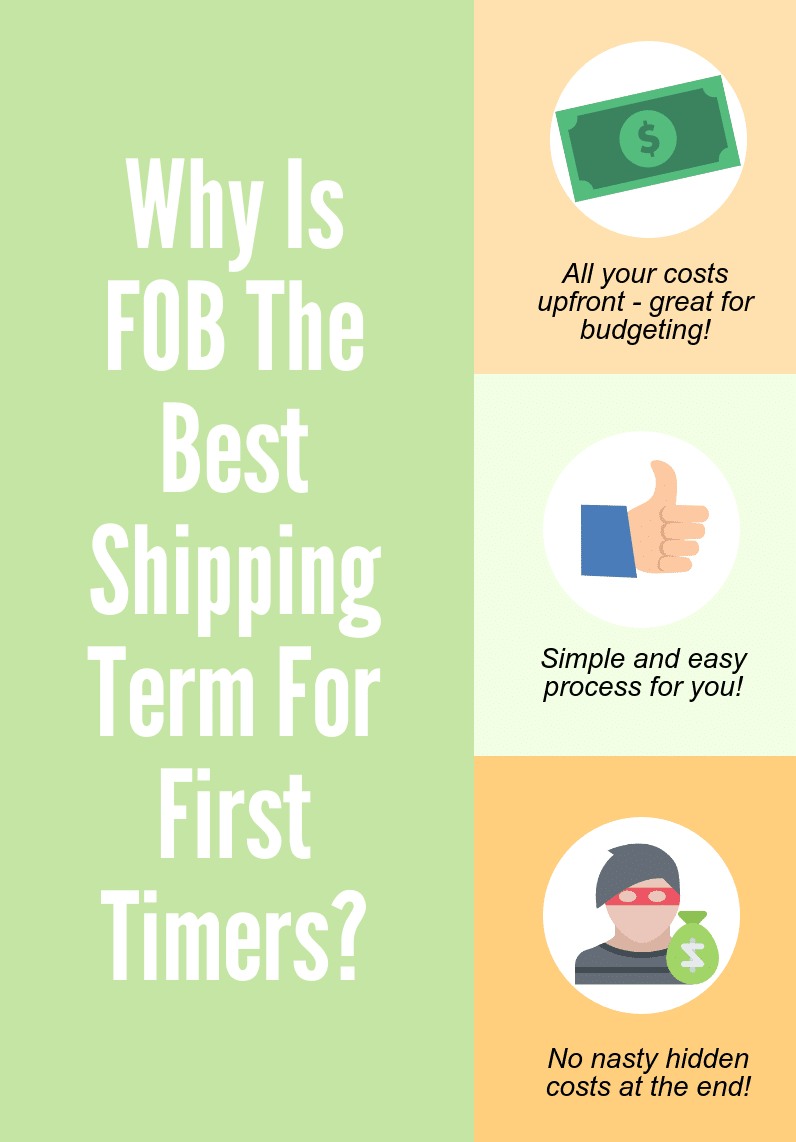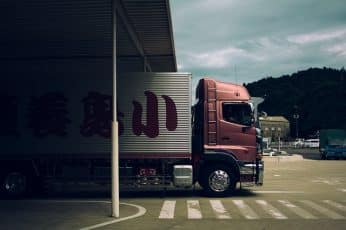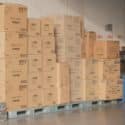If you were a fly on the wall in our office, the one word that would seep into your brain and lodge itself there for the rest of your life would be Free On Board (FOB). It’s so common that we ask most people who call for a quote “Is your supplier selling the goods on FOB shipping terms?”.
It’s such an integral part of our business that we were shocked to discover how little we’d actually written about it! In the spirit of our favourite Incoterm, today’s post is dedicated to explaining in further detail what FOB is and answering some of the most pressing questions that people have about it: “What does FOB mean and how much does FOB shipping cost?“
-
Free On Board (FOB) Definition
FOB (Free On Board) is an Incoterm (the sets of rules for international transit detailing responsibilities between suppliers and buyers) that evenly splits the costs and responsibilities between the buyer and supplier.
The seller is responsible for ALL the costs in the country of origin up to and including loading the goods onto the vessel at the outbound port. The buyer then pays all the costs from then onwards; the buyer pays for the freight and all the costs in the destination country.
Save
Save
Save
Save
Save
Save
-
Why we recommend FOB for all first time importers
Immediately, let us jump in and make it very clear: FOB is nearly always our recommended Incoterm. We can work with most shipping terms but we feel that for first-time importers FOB is the one you should go for. Why? Let’s see.
-
FOB allows you to control costs.
FOB allows you to see all of your costs upfront. Your supplier will charge you for one half of the process in one invoice and your freight forwarder will charge you for the second half, again with one invoice. You can request quotes and find out how much everything will cost before you commit to anything. If you’re delivering into the UK, we can give you a free no-obligation quote and talk you through the process.
As a small or start-up business, having all your costs upfront is essential for budgeting reasons – being blindsided by massive charges can completely ruin a startup.
-
FOB is easy.
On FOB shipping terms, you don’t have to do or organise anything. Your supplier takes charge of the first half of the process and your freight forwarder takes charge of the second. All you have to do is make sure you’re at home to accept delivery! And, if you’re delivering straight to an FBA warehouse, you don’t even have to do that!
-
There are no nasty surprises at the end.
This reason is a little harder to explain for people without detailed knowledge about shipping.
Think of it like this: The process of shipping has a (rough) fixed cost for all the services and steps in the process. Shipping terms determine who finds and pays for each service. If your supplier is responsible for the payment, you will pay the supplier more to cover these costs. It doesn’t negate the cost or mean you don’t pay – it means that they pay using the money you’ve paid them (which can save you money as they know their local markets and services better) and that you aren’t responsible for finding the service yourself or if anything goes wrong with that service.
The point is that shipping should cost you a similar amount on all shipping terms. However, there are certain shipping terms (CIF and CFR – also known as “your supplier getting your goods to a port near you”) which have attractively low prices. Your supplier might charge you $50 for shipping on CIF terms, but $350 for FOB. The problem?
All those costs get pushed onto an invoice at the end. That $300 difference still has to get paid – because it’s not profit; it’s money dished out to delivery companies, customs, shipping lines, freight forwarders, etc. It’s the cost of all the services in the process and it needs to get paid. After your goods are cleared into the UK, on your customs bill you’ll find a massive charge to be paid that you weren’t expecting or budgeting for.
The most confusing part? Your supplier isn’t even responsible for these charges. Chinese freight forwarders need to compete for business, so they offer obscenely low prices (sometimes even free!) to suppliers, who then in turn only charge you what they’re charged . . . and then the forwarder passes the charges that they accrue onto you as a C.I.S.F. (China Import Service Fee).
With FOB, there are no hidden fees. This is because on FOB shipping terms you (via your UK shipping company) are in control of which Chinese forwarder is used – your supplier will get your goods onto the vessel with their help and then your UK shipping company will take over from there.
We help our customers estimate how much UK Duty and VAT they’ll be paying once their goods reach the UK (the charges come from HMRC, not us, so we can’t 100% accurately tell you), so even the customs charge at the end won’t come as a surprise.
If you’re still confused about this one, (which is fair – it’s confusing) feel free to read our post on the Hidden Costs and Risks of CIF/CFR.
Save
Save
Save
Save
Save
Save
-
-
Is FOB the most expensive shipping term?
No.
First of all, the concept of saving money on shipping terms should not be what you’re focusing on. We’ve touched on this above, but the cost of shipping should (overall) be similar on all shipping terms or you’re likely to be hit with some massive costs. Shipping terms detail who’s responsible for the goods at which point and who pays for the service – but you still have to give the supplier the money to pay for the service.
So by this logic, no shipping term should be massively more expensive than the other – all that should differ is the amount that you need to do and are responsible for.
EXW is the Incoterm in which you’re responsible for the most costs. Your supplier literally just needs to make the goods and then they’re done – it’s up to you to arrange and pay for everything in China and the UK. This shipping term can look slightly more expensive as you’re responsible for the costs in China too, but your supplier’s invoice should be reduced to reflect that.
The supplier not having the risk in China, however, can open up a few issues:
- Any booking mistakes are your problem – if your supplier makes a mistake when they declare the goods, you can end up being responsible for the customs costs incurred to rectify it.
- You aren’t familiar with the local markets. Your suppliers may be able to get the goods to the port more cheaply than you can organise.
- There can be added variables; if your supplier doesn’t have an export license, you will be responsible for paying for one, which is expensive.
The most dangerous shipping term to use, in our experience, is usually CIF/CFR – this is due to the uncertainty of your final bill.
-
Who pays for what on FOB terms?
On FOB shipping terms, your supplier will pay for everything up until your goods are onboard the vessel (transport, export licenses, customs in the outbound country etc.). From there, the responsibility moves to you and you will need to arrange a freight forwarder to sort out shipping, customs clearance and delivery in the UK.
Remember: your supplier might pay, but you will be giving them the money to pay with on the invoice. Your supplier will either bake it into the cost of the items or add it on as a separate cost.
-
Why Are FOB Prices On Alibaba Higher?
If you’ve sourced stock on Alibaba before, you’ve likely noticed that Alibaba ask suppliers to offer a “FOB Price” and wondered what they are and why they’re higher than normal prices.
The short answer is that suppliers will calculate the local costs associated with FOB shipping terms and adjust the unit prices accordingly. If you aren’t shipping on FOB terms, you can ask them to separate the cost of the goods and the FOB costs.
Hopefully this post helped you to understand FOB pricing and costs a bit better; if you are looking to import to the UK and would like some advice or a free quote, feel free to shoot us an email or call!
I really appreciated the diligence and care with which Alex at Shippo helped me to complete my first China to UK shipment. Their efficiency and your insights throughout have been invaluable and their sea freight rates were the most competitive. I’ll most definitely use Shippo in the futureAdvance Global -
Protect Yourself From Hidden Fees When Importing From China
0 commentsWe all want an all-inclusive quote when we’re offered a price right…? When it comes to importing this isn’t always the case. Shippo can make
LCL – How Will My Goods Be Delivered
0 commentsThe standard delivery offered when importing goods to the UK is kerbside. This means that the driver will park up outside your premises and it’s
FCL – How Will My Goods Be Delivered?
0 commentsAs with the standard deliveries, full container load deliveries are “kerbside” This means the container will arrive on the back of the truck and you’ll
